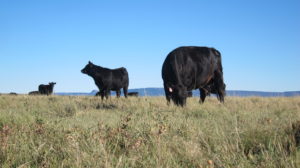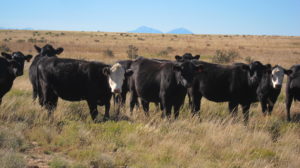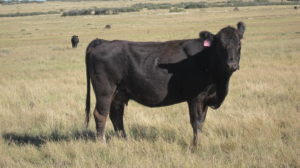Is Alfalfa Considered Grass Fed Beef
What is Grass-Finished Beef? There's a lot of confusion on what grass-fed and grass-finished beef really means. Unfortunately, if you ask 10 experts you will probably get 6 different answers. In this month's blog post, we'll demystify the definition of grassfed beef, as well as grass finished beef, and why it's important that you know the difference.
All Beef Is Not Raised the Same
 Wait, don't all cows eat grass? The answer is yes, but…here's the deal. All cattle start off eating grass, whether it's foraging in the pasture or eating hay in the feedyard. A vast majority of US beef is shipped off to a contencented animal feeding operation (CAFO, aka feedlots) to 'fatten up' the cows several months before slaughter. You've probably driven by a cattle feedlot on the highway — you can't miss the terribly strong smell. Animals finished in a feedlot are typically fed a diet of corn, food waste (including Skittles and Twinkies!), additives and very often hormones and antibiotics. Feedlot beef is bad for the environment, not sustainable and unhealthy for us to eat!
Wait, don't all cows eat grass? The answer is yes, but…here's the deal. All cattle start off eating grass, whether it's foraging in the pasture or eating hay in the feedyard. A vast majority of US beef is shipped off to a contencented animal feeding operation (CAFO, aka feedlots) to 'fatten up' the cows several months before slaughter. You've probably driven by a cattle feedlot on the highway — you can't miss the terribly strong smell. Animals finished in a feedlot are typically fed a diet of corn, food waste (including Skittles and Twinkies!), additives and very often hormones and antibiotics. Feedlot beef is bad for the environment, not sustainable and unhealthy for us to eat!
The Grass Fed Beef Difference
We consider Grass Fed Beef to be cattle that are free range, pasture fed and raised on a diet of natural and native grasses. Ranchers usually supplement a cow's diet with other grasses like  alfalfa and also feed them "cake." Cake is simply a mixture of grass, hay and other plant proteins like cotton seed, oats and barley. At River Watch Beef, we feed our cows a little cake to supplement their diet with essential vitamins, minerals and proteins. Our cake is certified organic, non-GMO and contains no corn. This is necessary, or the cows won't have the full complement of nutrients they need.
alfalfa and also feed them "cake." Cake is simply a mixture of grass, hay and other plant proteins like cotton seed, oats and barley. At River Watch Beef, we feed our cows a little cake to supplement their diet with essential vitamins, minerals and proteins. Our cake is certified organic, non-GMO and contains no corn. This is necessary, or the cows won't have the full complement of nutrients they need.
Many products labeled "Grass Fed Beef" are not truly grass-fed meat. Beware so-called grassfed beef (and other meat) from New Zealand, Australia, Argentina and other countries. Those countries do not have to comply with USDA inspection at slaughter and butchering. It's important to know where your food comes from. We recommend buying grass-fed beef from a reputable USA family beef producer. Read more about common grass-finished beef questions on our FAQs page.
Grass Fed Beef is also a healthier option compared to most meat available at the grocery store. Beef that's grass-finished has 30% less total fat, lower cholesterol and more conjugated linoleic acid (CLA), compared to grain-fed beef. Grass-fed beef is also a rich in antioxidant vitamins, heart-healthy Omega-3s and essential minerals.
What Is Grass Finished Beef?
Currently, there is no standard definition for Grass Finished Beef. You pretty much have to take the word of the beef producer that they raise grass-fed and grass-finished beef. This will probably not change in foreseeable future. The big beef producers do not want be transparent in how they raise and process their beef animals. As consumers, we should demand more transparency with all foods, especially beef.
Is Grass Finished Beef Organic?
 The short answer is probably yes, but it's (very) expensive to be be certified organic and have the "organic" beef label. Most family farms can't afford to go through the expensive and lengthy process to have a certified organic label, even though their beef is organically-raised in the pasture. Again, we encourage folks to know where your grass-fed beef comes from. Reputable family beef producers will tell you exactly how they raise their red meat.
The short answer is probably yes, but it's (very) expensive to be be certified organic and have the "organic" beef label. Most family farms can't afford to go through the expensive and lengthy process to have a certified organic label, even though their beef is organically-raised in the pasture. Again, we encourage folks to know where your grass-fed beef comes from. Reputable family beef producers will tell you exactly how they raise their red meat.
At River Watch Beef, our grass fed beef is raised organically. Our pastures have never been sprayed with chemicals, ever. But, we are not labeled certified organic beef, yet. We hope to be labeled an organic product soon.
Most US Beef is Grain Fed (on Corn)
Unfortunately, most of the cattle produced in the USA have a primary diet of grains, mostly corn. Other grains used in feedlot beef, include: wheat, sorghum, maize, lupins, soybeans, cracked corn and more. Cows with a primary diet of corn and other grains result in additional unhealthy fat and increased calories in the meat.
How Can I Buy Quality Grass Finished Beef?

We encourage you to order beef from a reputable grass-finished beef source — the cows should be free range and free to forage in the pasture. You can usually find grass fed and grass finished beef at your local farmer's market or organic grocery store. You can also by grass-finished beef online through River Watch Beef.
About River Watch Beef
River Watch Beef was founded in 2016 with a mission to produce the highest quality grass-fed beef possible. We offer a variety of Grass Fed Beef Packages, or you can create your own Custom Beef Box. Join our Grass Fed Beef Club to have top quality beef delivered to your door each month (bimonthly and quarterly options available). Check out our "almost-famous" small batch beef jerky — choose from Mild, Sweet Peppered and Teriyaki flavors.
Save 10% Off Your First Order
Order premium Grass Fed Beef today and Save 10% off your order. Use coupon code 'first' at checkout.
Grass Finished Beef Resources
You can learn more about grass finished beef and other natural meats with these resources:
- Mayo Clinic: "Grass-fed Beef: What are the heart-health benefits?"
- US National Library of Medicine: "A review of fatty acid profiles and antioxidant content in grass-fed and grain-fed beef"
- Cleveland Clinic: "Grass-fed vs. Organic Meat: What's the Difference? What you buy can affect your health and the environment too"
- Wikipedia: Cattle Feeding and animal husbandry
- Merriam-Webster Dictionary: Definition of Grass-Feed (regarding grass fed beef cattle)
- Grass Fed Beef Recipes: Delicious grass fed beef recipes
Source: https://riverwatchbeef.com/2020/01/what-is-grass-finished-beef/
0 Response to "Is Alfalfa Considered Grass Fed Beef"
Post a Comment